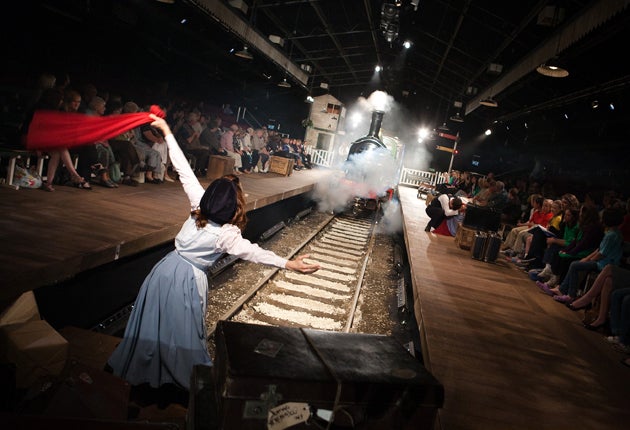A new platform for an enduring classic
It's an honour to adapt The Railway Children for the stage, says playwright Mike Kenny – but it comes with a lot of baggage

Your support helps us to tell the story
From reproductive rights to climate change to Big Tech, The Independent is on the ground when the story is developing. Whether it's investigating the financials of Elon Musk's pro-Trump PAC or producing our latest documentary, 'The A Word', which shines a light on the American women fighting for reproductive rights, we know how important it is to parse out the facts from the messaging.
At such a critical moment in US history, we need reporters on the ground. Your donation allows us to keep sending journalists to speak to both sides of the story.
The Independent is trusted by Americans across the entire political spectrum. And unlike many other quality news outlets, we choose not to lock Americans out of our reporting and analysis with paywalls. We believe quality journalism should be available to everyone, paid for by those who can afford it.
Your support makes all the difference.This week my play of The Railway Children pulls in to Waterloo, where it will be staged in the old Eurostar terminus. But its journey started years ago with a visit the director Damian Cruden and I made to the National Railway Museum in York.
I was already carrying luggage. Middle-aged women kept telling me not to mess with their childhood memories. And then there was the film. I was never a great lover of it. In my defence, it came out when I was in my late teens. I was more interested in obscure foreign films and rock music. I was set on escaping the small town where I'd grown up, and Beeching had just cut the branch line that was my way out.
The full resources of the NRM, one of our finest museums, were at our disposal. Damian and I found the diesel shed at the back of the museum. It had a railtrack running through the middle of it. Before long we were talking about creating a replica of an Edwardian station and putting the play on right there.
Next stop, the train – The Stirling Single. Men of my acquaintance started to talk to me with misty eyes about steam trains. More luggage! I thought I'd sink under the weight of it. The Stirling Single is very beautiful and I truly came to love it, but it's the biggest diva I have ever worked with. When the train arrives, you see, no one looks at anything else. Plus, it's all well and good talking about stopping a train with red flannel petticoats, but when you come to do it, the reality requires an actress to stand on a track in front of 60-odd tons of moving metal. For months and months we talked about that train. I began to feel I was writing not a play but an elaborate warm-up act. Still, when push comes to shunt, she knows how to make an entrance. It was worth it.
E. Nesbit's book itself is fantastic, grittier than I remembered and surprisingly modern. The story carries the weight of single parenthood, class differences, political refugees, false imprisonment, growing sexual awareness and bears it all as lightly as a feather. My breakthrough moment came around the time that we started to talk about trucking sets on and off on the lines. I had a very strong picture of the family at the heart of the piece literally being uncoupled – the father being trucked in one direction and the rest of the family in another. I suddenly realised that in this story we had the kind of theatrical metaphor you only ever get to work with very rarely.
Coming to London has been extraordinary. We are now literally on the move. Of all my plays, I never thought for a moment that this would be the one to have a life beyond its first production. After all, you need a station and a train in order to stage it. Then one day Sarah Quintrell, who plays Bobby, was on her way home to south London and clocked the fact that the old Eurostar terminus was still empty. We had found our next venue.
The goodwill that surrounds this story is amazing. The mistrust that greeted me at the beginning turned into handshakes and hugs in the street from total strangers. Theatre looks like fun, but often it isn't. This time it actually was. The cast and crew bonded and this reached out to the audiences. I'm sure the audience in Waterloo will have the same experience.
After I'd written the play, I watched the film again, for the first time in almost 40 years. It is different from our play, mostly thanks to the time it was created. This time I snivelled – as only a middle-aged man can at the reunion of father and daughter.
'The Railway Children', Waterloo Station, London SE1 (0871 297 0740; Yorkshire.com/railwaychildren) to 5 September
Join our commenting forum
Join thought-provoking conversations, follow other Independent readers and see their replies
Comments